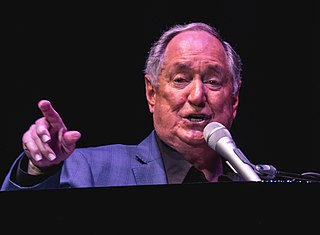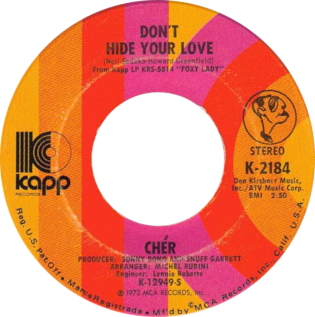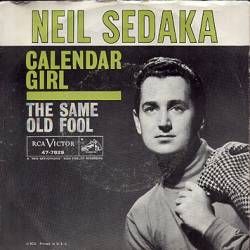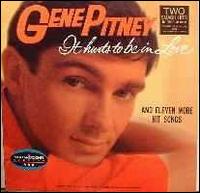Related Research Articles

Gene Francis Alan Pitney was an American singer-songwriter and musician.

Neil Sedaka is an American singer-songwriter and pianist. Since his music career began in 1957, he has sold millions of records worldwide and has written or co-written over 500 songs for himself and other artists, collaborating mostly with lyricists Howard "Howie" Greenfield and Phil Cody.

Howard Greenfield was an American lyricist and songwriter, who for several years in the 1960s worked out of the famous Brill Building. He is best known for his successful songwriting collaborations, including one with Neil Sedaka from the late 1950s to the mid-1970s, and near-simultaneous songwriting partnerships with Jack Keller and Helen Miller throughout most of the 1960s.
Toni Wine is an American pop music songwriter, who wrote songs for such artists as The Mindbenders, Tony Orlando and Dawn ("Candida"), and Checkmates, Ltd. in the late 1960s and 1970s. Wine also sang the female vocals for the cartoon music group The Archies, most notably on their #1 hit song "Sugar, Sugar". She shared the lead vocals in the Archies' subsequent single, "Jingle Jangle" with Ron Dante using his falsetto voice. In addition, Wine was a backing vocalist on "It Hurts to Be in Love" and on Willie Nelson's "Always on My Mind."

"Laughter in the Rain" is a song composed and recorded by Neil Sedaka, with lyrics by Phil Cody. It includes a 20-second saxophone solo by Jim Horn.

"Breaking Up Is Hard to Do" is a song recorded by Neil Sedaka, co-written by Sedaka and Howard Greenfield. Sedaka recorded this song twice, in 1962 and 1975, in two significantly different arrangements, and it is considered to be his signature song. Between 1970 and 1975, it was a top-40 hit three separate times for three separate artists: Lenny Welch, The Partridge Family and Sedaka's second version.

"Don't Hide Your Love" is a song released by American singer-actress Cher as the second single released from the album Foxy Lady. The song was written by Neil Sedaka and Howard Greenfield. It hit number 46 on the Billboard Hot 100, and number 19 on the Adult Contemporary chart. Allmusic editor Joe Viglione wrote that this song should have been duet with the songwriter himself, because it would bring him back into the public eye.

"Love Will Keep Us Together" is a song written by Neil Sedaka and Howard Greenfield. It was first recorded by Sedaka in 1973. The brother-sister duo Mac and Katie Kissoon recorded their version of the song in 1973. American pop duo Captain & Tennille covered the song in 1975, with instrumental backing almost entirely by “Captain” Daryl Dragon, with the exception of drums played by Hal Blaine; their version became a worldwide hit.

"He's a Rebel" is a song written by Gene Pitney that was originally recorded by Vikki Carr and by the girl group the Blossoms. Produced by Phil Spector, the Blossoms' version was issued as a single credited to the Crystals, which topped the Billboard Hot 100 chart in November 1962. It was Spector's second chart-topper after "To Know Him Is to Love Him" (1958).

"Lonely Night (Angel Face)" is a song written by Neil Sedaka. The song was first recorded by Sedaka and appeared as a track on his 1975 studio album, The Hungry Years. The following year the song was made popular when covered by the pop music duo Captain & Tennille, who took their version to number 3 on the Billboard Hot 100.

"Calendar Girl" is a song by Neil Sedaka. The music was composed by Sedaka and the lyrics by Howard Greenfield. Recorded in 1959 and released in December 1960 as a single, it was a Top-5 hit single for Sedaka, peaking at No. 4 on the US charts, No. 3 in Australia, and No. 1 on the Canadian and Japanese charts.
The following is a comprehensive discography of Neil Sedaka, the American singer.

The Other Side of Me is the thirty-fifth studio album by American pop singer Andy Williams, released in the summer of 1975 by Columbia Records and including the 1973 recording of "Solitaire" from his album of the same name alongside 10 original recordings, four of which were also by "Solitaire" composer Neil Sedaka. After unsuccessful attempts to leave behind the formulaic album genre of easy listening covers of pop hits, The Other Side of Me offered a compromise by filling half of the sides with material that was popularized by other artists and the other half with either new or obscure selections.
Helen Miller was an American songwriter. She collaborated with several lyricists, notably Howard Greenfield in the early 1960s, and with him wrote several pop hits, including "Foolish Little Girl" by The Shirelles, and "It Hurts To Be In Love" by Gene Pitney.

It Hurts to Be in Love and Eleven More Hit Songs is American singer Gene Pitney's ninth album, released on the Musicor label in the United States in 1964. The album was released as I'm Gonna Be Strong on the Stateside label in the United Kingdom.

It Hurts to Be in Love is the fourth studio album from American singer and songwriter Dan Hartman, released by Blue Sky in 1981. It was produced by Hartman and mixed by Neil Dorfsman.

"All I Need" is a song by the American musician Dan Hartman, released in 1981 as the third and final single from his fourth studio album It Hurts to Be in Love. It was written and produced by Hartman.
Virginia Mazarro, known professionally as Ginny Arnell, is an American former pop and country music singer and songwriter who recorded in the late 1950s and early 1960s.

"Our Last Song Together" is a 1973 song recorded by Neil Sedaka. It is a track from his LP The Tra-La Days Are Over, and was the third of four single releases from the album.

"Yours Until Tomorrow" is a song written by Gerry Goffin and Carole King, recorded by Dee Dee Warwick in 1968. It was used as the B-side to her recording of "I'm Gonna Make You Love Me." Versions by, respectively, Vivian Reed and Gene Pitney performed on music charts.
References
- ↑ "Gene Pitney - Record Details" . Retrieved 2016-12-20.
- 1 2 "Gene Pitney - Awards". AllMusic. Retrieved 2013-03-12.
- 1 2 Unterberger, Richie. "It Hurts to Be in Love - Gene Pitney : Listen, Appearances, Song Review". AllMusic. Retrieved 2013-03-12.
- ↑ Stephen Thomas Erlewine. "Dan Hartman | Awards". AllMusic . Retrieved 2014-07-03.
- ↑ "It Hurts to Be in Love - Annie Laurie : Listen, Appearances, Song Review". AllMusic. Retrieved 2013-03-12.
- ↑ "Cover versions of It Hurts to Be in Love written by Julius Dixon, Rudy Toombss". Secondhandsongs.com. Retrieved 16 June 2023.
- ↑ Hot 100 - Gene Pitney It Hurts to Be in Love Chart History, Billboard.com. Retrieved June 27, 2018.
- ↑ Whitburn, Joel (2004). The Billboard Book of Top 40 Hits: Eighth Edition. Record Research. p. 493.
- ↑ Cash Box Top 100, Cash Box , October 10, 1964. p. 4. Retrieved June 27, 2018.
- 1 2 "100 Top Pops", Record World , October 17, 1964. Retrieved June 27, 2018.
- ↑ "Top 40-5s". RPM . Vol. 2, no. 7. October 12, 1964. Retrieved June 27, 2018.
- 1 2 Gene Pitney - Full Official Chart History, Official Charts Company. Retrieved June 27, 2018.
- ↑ "Item Display - RPM - Library and Archives Canada". Collectionscanada.gc.ca. 1964-10-12. Retrieved 2018-07-09.
- ↑ Joel Whitburn's Top Pop Singles 1955–1990 - ISBN 0-89820-089-X
- ↑ "Cash Box Top 100 10/10/64". tropicalglen.com.
- ↑ "Top 100 Hits of 1964/Top 100 Songs of 1964". Musicoutfitters.com.
- ↑ "Cash Box YE Pop Singles - 1964". tropicalglen.com. Archived from the original on August 9, 2020.
- ↑ "Durocs Biography, Songs, & Albums". AllMusic. Retrieved 16 June 2023.
- ↑ "It Hurts to Be in Love - Dan Hartman | User Reviews". AllMusic. Retrieved 2020-01-13.
- 1 2 3 4 "Dan Hartman It Hurts To Be In Love Chart History". Billboard. Retrieved 2020-01-13.
- ↑ Smyntek, John (26 April 1981). "Sound judgement: Pop". Detroit Free Press.
- ↑ "Records". The Morning Call. 9 May 1981.
- ↑ Marsh, Dave (17 July 1981). "Edmunds rolling along with rock retreads". Fort Lauderdale News.
- ↑ "Picks and Pans Review: It Hurts to Be in Love". People.com. Retrieved 2020-01-13.
- ↑ Downey, Pat; Albert, George; Hoffmann, Frank W. (November 13, 1994). Cash box pop singles charts, 1950-1993. Libraries Unlimited. ISBN 9781563083167 – via Google Books.